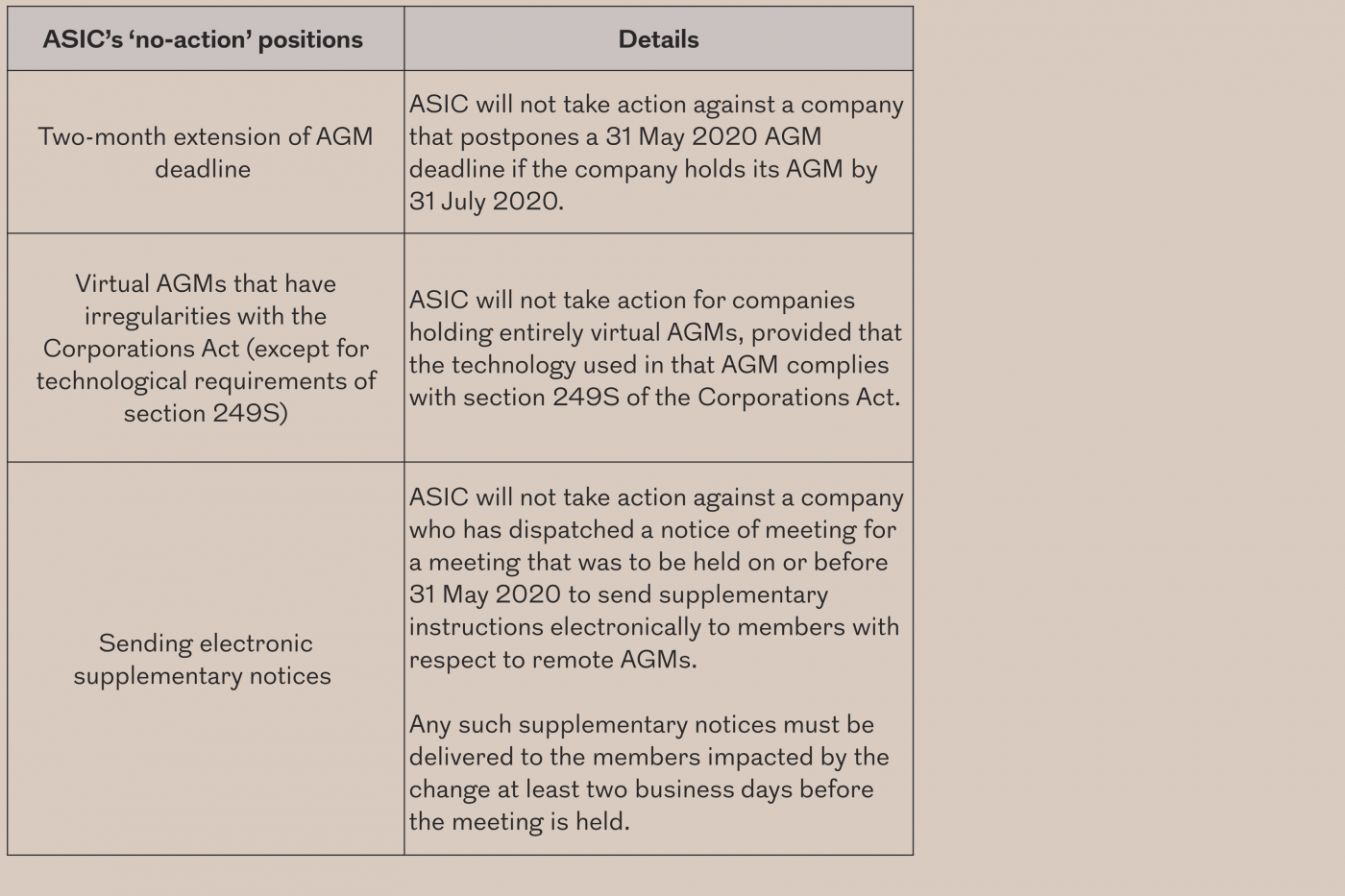With the steady rise of COVID-19 and increasingly more stringent government bans on travel and large gatherings, many Australian companies may be at risk of breaching their statutory obligation to hold an Annual General Meeting (AGM).
Under section 250N of the Corporations Act 2001 (Cth), public companies with more than one member are required to hold an AGM at least once in each calendar year and within 5 months after the end of its financial year. For companies with a financial year ending on 31 December 2019, there is a statutory requirement to hold an AGM by 31 May 2020. While holding an AGM is not mandatory for proprietary companies, many such companies hold AGMs nonetheless. Therefore, the COVID-19 pandemic may impact both listed and unlisted company AGM plans.
To assist companies with meeting their AGM obligations amidst the COVID-19 crisis, the Australian Securities and Investments Commission (ASIC) has issued the 20-068MR guidelines1 which falls within the scope of Regulatory Guide 1082 (No-action letters). ASIC's guideline outlines the regulator's 'no-action' position to the makeshift measures that companies will have to resort to in order to satisfy their corporate obligations, including that:
- ASIC will take no action against companies' postponement of their upcoming AGM for up to two months (ie. until 31 July 2020); and
- ASIC will permit and accept for AGMs to be conducted remotely.
ASIC's guidelines seek to encourage companies against holding an AGM that would put them in violation of government restrictions (such as holding large member gatherings) during this time.
Hybrid and Virtual AGMs
ASIC has formally confirmed that the status of hybrid AGMs (AGMs conducted in a physical location but with online facilities) are valid and permissible under the Corporations Act. However, ASIC has left the validity of virtual AGMs (AGMs conducted completely online) open, addressing the fact that there may be potential issues with the validity of resolutions passed by way of virtual AGMs.
In spite of this, ASIC has confirmed that it intends to also take a 'no-action' position with respect to the conduct of virtual AGMs that may not be consistent with the Corporations Act, provided that the technology used in the AGM complies with section 249S of the Corporations Act. This includes that the technology used in such meetings provides reasonable opportunities for members as a whole to participate (such as having the ability ask questions), and that voting is able to occur by poll rather than a show of hands. In other words, any irregularity in connection with virtual AGMs held to satisfy statutory requirements of an AGM will not be deemed invalid by ASIC unless a Court declares that the meeting is void or has caused substantial injustice.
Supplementary AGM Notices
ASIC has also stated its intention to take no action against companies that send an electronic supplementary notice of meeting to members regarding remote participation, where that company has already dispatched a notice in relation to a meeting planned to be held before 31 May 2020.
Company Constitutions
In spite of the above, ASIC warns that companies should be mindful to review their company constitutions to consider whether there are restrictions in place that may limit the company's ability to remotely conduct an AGM. ASIC also encourages companies who have dispatched a notice of meeting to their members to provide supplementary instructions to the members to facilitate any remote AGM.
In order to rely on ASIC's 'no-action' positions, companies should assess the following:
- whether the company's constitution allows the company to adopt alternative remote means to conduct an AGM;
- if a company wishes to conduct a virtual AGM, whether the company's technology sufficiently satisfies requirements prescribed under the Corporations Act; and
- that the company is compliant with member notification obligations.
Conclusion
In summary, ASIC supports and encourages companies (whether or not the companies choose to defer their AGM) to hold hybrid or virtual AGMs during this period of uncertainty caused by the COVID-19 pandemic.
In particular, ASIC has adopted a "no action" position in respect of the following matters concerning AGMs:

Companies should note that ASIC's stance on these matters does not necessarily preclude either ASIC or third parties (including the DPP) from taking legal action in relation to the above conduct and will not prevent a court from holding that a company's conduct is contrary to legislative requirements. Rather, the 'no action' letter is merely a statement of intention rather than a 'catch-all pass' for companies to act in a way that is contrary to ordinary guidelines and legislation.
Hazelbrook offers corporate secretarial services to assist companies to remain compliant to corporate obligations, whether in times of crisis or otherwise.
REFERENCES
1 20-068MR Guidelines for meeting upcoming AGM and financial reporting requirements ➝
2 Regulatory Guide 108 - No-action letters ➝
The content of this article is intended to provide a general guide to the subject matter. Specialist advice should be sought about your specific circumstances.



